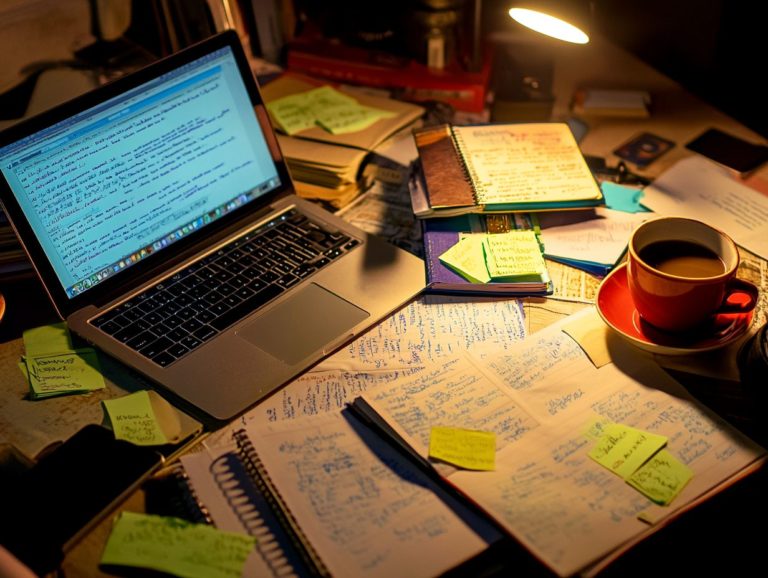building a study space for maximum focus
Creating an effective study space can profoundly influence your learning experience and enhance your productivity. Get ready to transform your study space!
This article delves into the essential factors to consider when designing your ideal study environment, covering everything from lighting and comfort to organization.
You will also discover ways to minimize distractions and optimize your focus, ensuring you remain motivated throughout your study sessions.
You will learn how to maintain a healthy study space with ergonomic tips and self-care strategies.
Contents
- Key Takeaways:
- Designing an Effective Study Space
- Essential Elements of a Study Space
- Creating a Distraction-Free Environment
- Optimizing Productivity in Your Study Space
- Maintaining a Healthy Study Space
- Frequently Asked Questions
- What are the essential elements of a study space for maximum focus?
- How can I create a distraction-free study environment?
- Is it necessary to have a designated study space?
- What type of lighting is best for a study space?
- How can I make my study space comfortable?
- Are there any tips for staying organized in my study space?
Key Takeaways:
- Choose a study space with good lighting.
- Invest in comfortable seating.
- Organize your supplies to boost productivity.
- Minimize noise for a distraction-free environment.
- Consider ergonomic factors for your well-being.
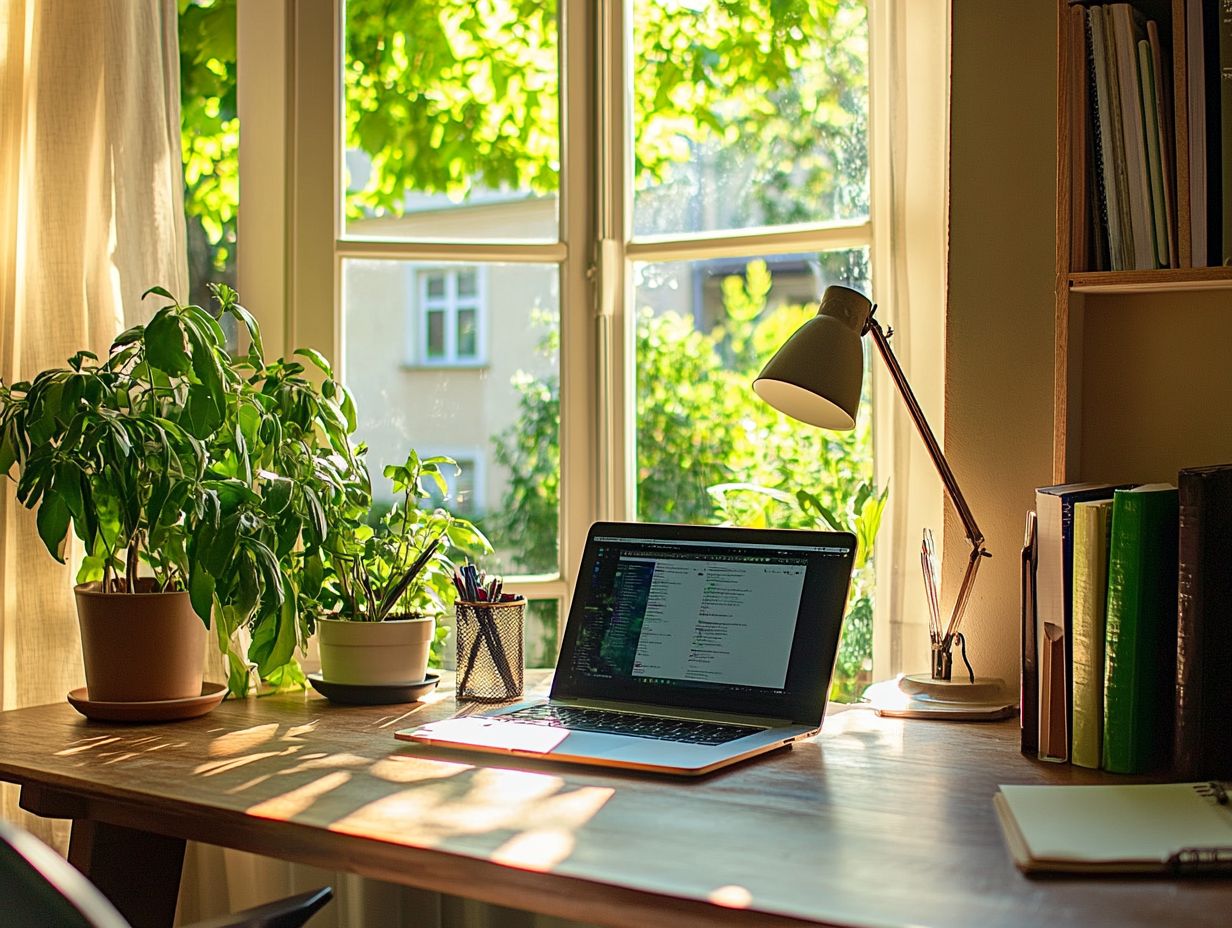
Designing an Effective Study Space
Designing an effective study space is essential for elevating your academic performance, particularly if you’re immersed in online learning at Fullstack Academy. A thoughtfully crafted study area can significantly influence your focus and time management.
Key elements such as a tidy workspace, appropriate study materials, and ergonomic support are crucial for establishing a comfortable atmosphere that minimizes distractions and enhances motivation.
By carefully considering these factors, you can refine your study habits and unlock your full learning potential.
Factors to Consider
When you set out to design an effective study space, there are several key factors to consider for optimal learning and retention.
First, think about the noise level; a quieter environment can significantly boost your concentration, while background chatter may lead to unwelcome distractions.
Comfort is equally important. Investing in a supportive chair and ensuring you have adequate lighting can transform lengthy study sessions from unbearable to manageable.
Incorporating efficient study techniques, such as working in focused intervals or reviewing materials actively, can help you structure your study time effectively.
These elements create a conducive atmosphere where you can minimize distractions and enhance your motivation, ultimately guiding you toward your academic goals.
Essential Elements of a Study Space
The essential elements of your study space include proper lighting, comfort, and organization each playing a crucial role in fostering a clutter-free environment that enhances your learning experience.
Prioritizing these aspects will create an atmosphere where focused study can thrive.
Lighting, Comfort, and Organization
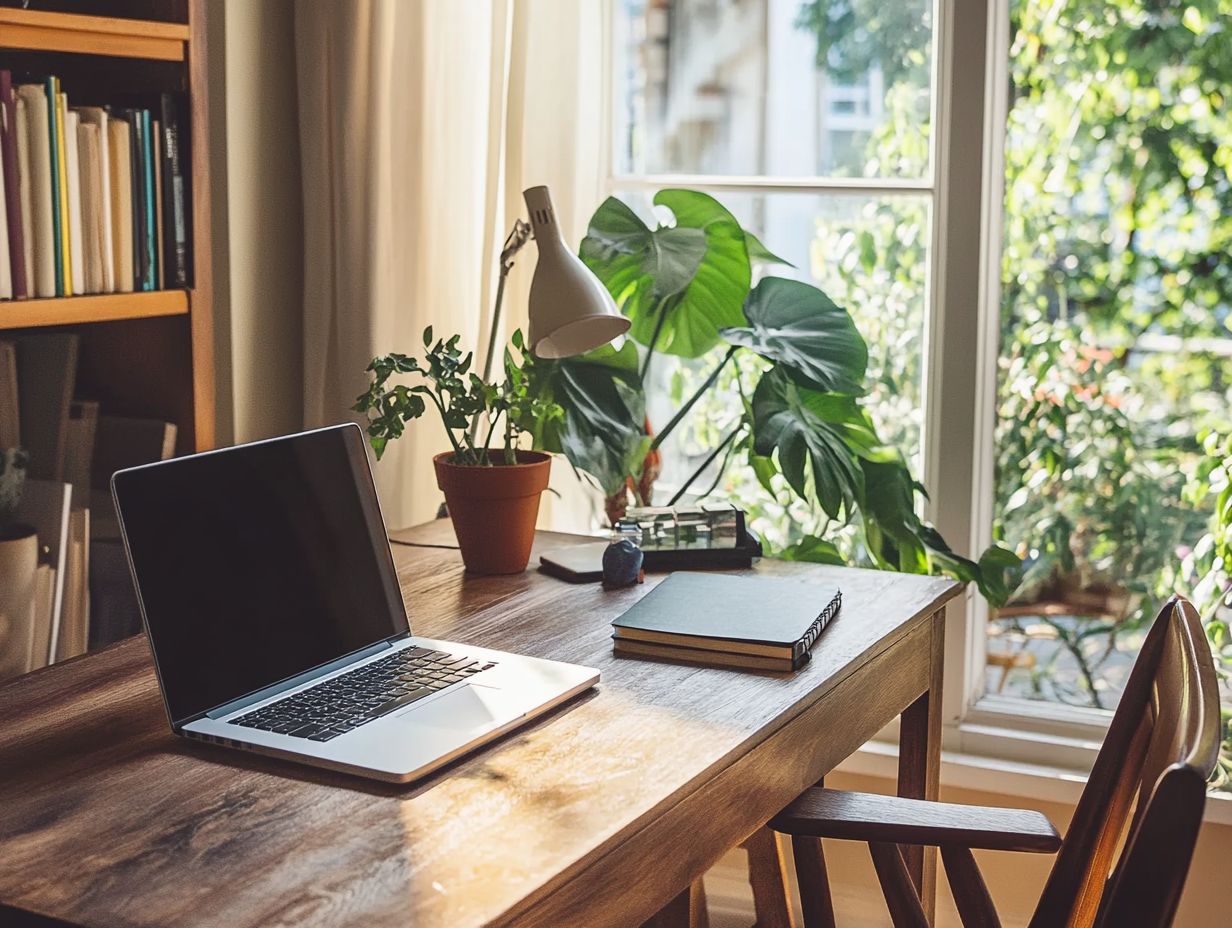
Proper lighting, a comfortable chair, and an organized study area are vital elements that create an effective study environment. Natural light, in particular, significantly enhances both mood and productivity.
Research indicates that exposure to sunlight elevates serotonin levels, alleviating stress and anxiety, which allows you to concentrate better on your tasks.
Investing in a comfortable chair is equally important; it helps you maintain good posture and prevents fatigue during those long study sessions.
Combining this with an organized study space cultivates a harmonious atmosphere that minimizes distractions and promotes a more engaging and efficient learning experience.
To truly harness the benefits of these factors, prioritize your study environment.
Creating a Distraction-Free Environment
Establishing a distraction-free environment is vital for sustaining focus and elevating productivity during your study sessions.
Minimizing Noise and Distractions
Minimizing noise and distractions is essential for creating a focused environment that enables effective study sessions. This means silencing smartphones and other devices that tend to steal your attention. Establish a dedicated study space free from visual clutter.
Organizing your study materials books, notes, and stationery can dramatically cut down the time you spend searching for resources. This helps you maintain your concentration.
When your workspace is tidy and organized, you re much better equipped to tackle academic challenges and stay aligned with your study goals. Consider setting specific time blocks for studying, complemented by short breaks to enhance your productivity.
These strategies create a structured approach, fostering an atmosphere that is truly conducive to learning and achievement.
Optimizing Productivity in Your Study Space
To optimize productivity in your study space, it s essential to employ effective strategies and study techniques that elevate both your efficiency and overall performance.
With the right approach, you can transform your environment into a powerhouse of concentration and achievement.
Tips for Staying Focused and Motivated
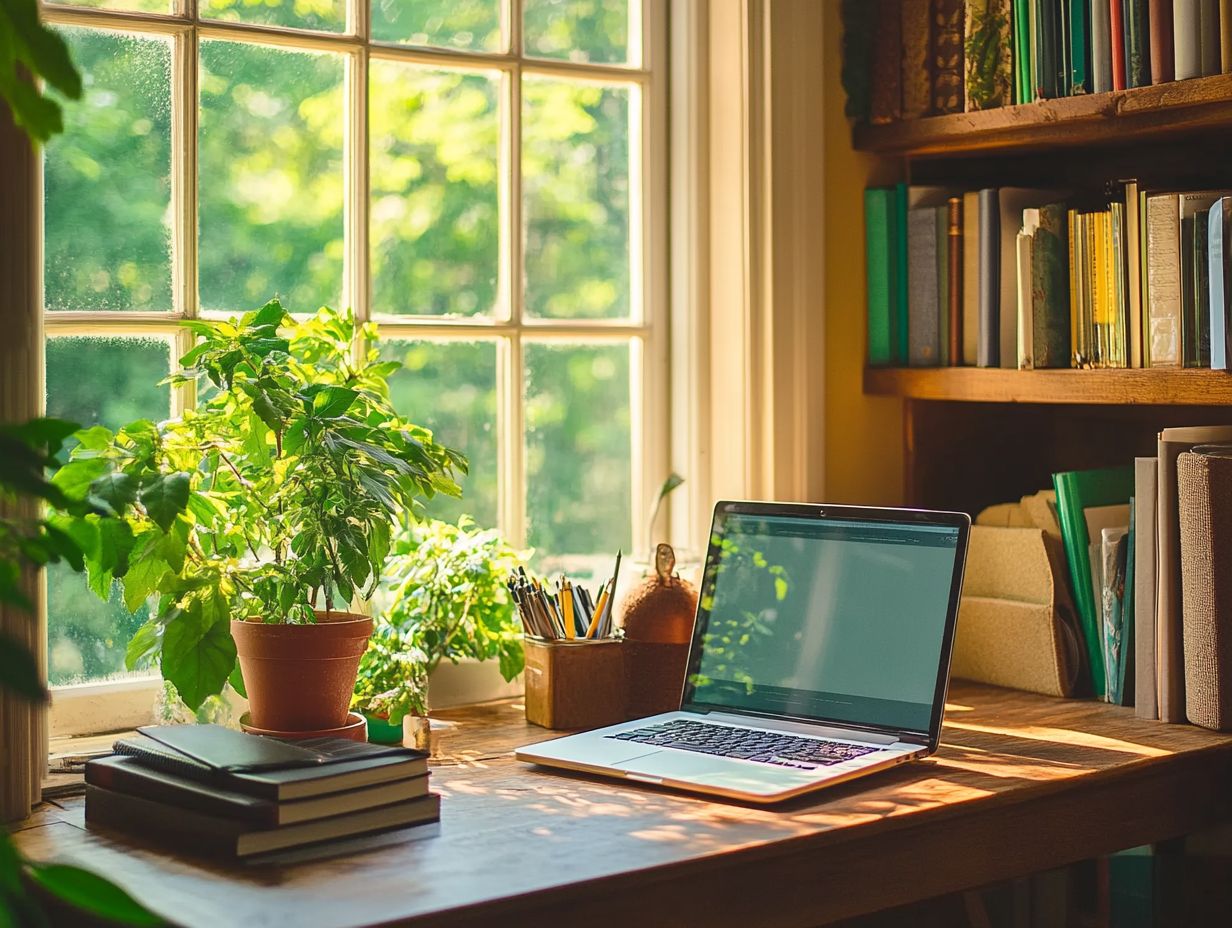
Staying focused and motivated during your study sessions can indeed be a challenge. However, with the right strategies, you can enhance your concentration and manage your time effectively.
Start by setting clear study goals. Outlining what you need to accomplish makes it much easier to focus your attention where it truly matters.
Break your study material into manageable chunks. This approach alleviates feelings of overwhelm and allows for regular breaks, keeping your brain refreshed and engaged.
Incorporating time management techniques, like the Pomodoro Technique, can further boost your concentration. By creating structured intervals for studying and resting, you can find a rhythm that works for you.
Embrace these methods to greatly boost the quality of your study time and watch your grades soar!
Maintaining a Healthy Study Space
Maintaining a healthy study space is essential for your physical well-being and academic success.
Prioritizing comfort and self-care practices can significantly enhance your focus and productivity.
Comfort and Self-Care
Comfort and self-care practices are pivotal in cultivating a supportive learning environment that lays the groundwork for enduring academic success.
When you prioritize comfort with thoughtful choices like investing in chairs designed for comfort and efficiency and well-designed desks you establish a foundation that not only enhances your well-being but also elevates your concentration and productivity.
Decluttering your workspace can lead to mental clarity. A tidy, organized area signals to your brain that it s time to focus, enabling you to fully immerse yourself in your tasks without the visual chaos that often disrupts attention.
By integrating these elements, you can significantly enhance the quality of your study sessions and ultimately improve your academic performance.
Frequently Asked Questions
What are the essential elements of a study space for maximum focus?
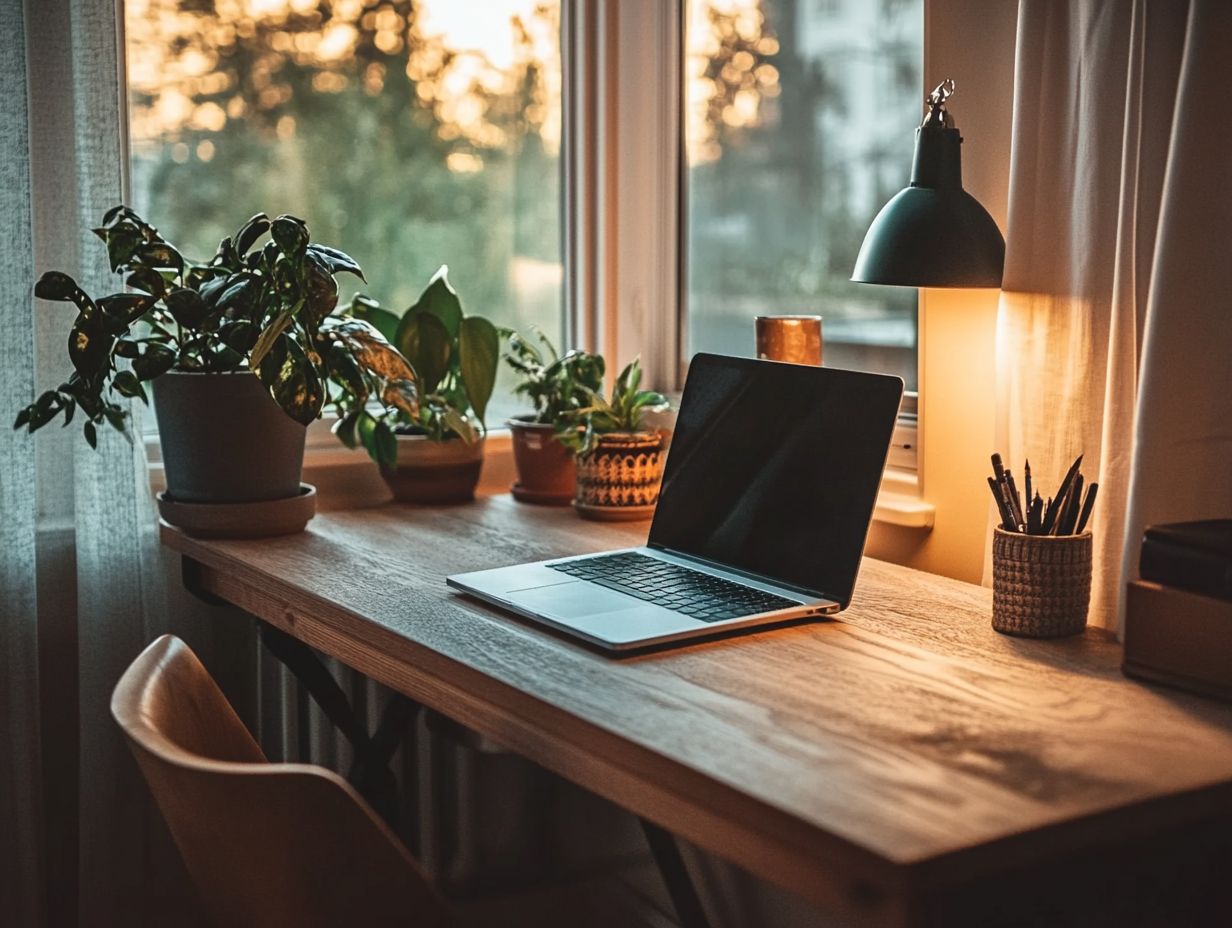
The essential elements of a study space for maximum focus include a quiet and well-lit area, a comfortable and ergonomic chair, a clutter-free desk, necessary supplies and materials, and a reliable internet connection. Additionally, learning how to create a distraction-free study zone can further enhance your concentration and productivity.
How can I create a distraction-free study environment?
To create a distraction-free study environment, remove unnecessary items like clutter and distractions from your study space. Turn off your phone or put it on silent mode, use noise-cancelling headphones, and let your family members or roommates know that you need a quiet study space.
Is it necessary to have a designated study space?
A designated study space helps create a routine. It separates study time from leisure time. If you lack a dedicated space, find a quiet corner or a table to use instead.
What type of lighting is best for a study space?
Natural lighting is ideal for studying. It reduces eye strain and boosts your alertness. If natural light isn’t available, use a warm, white desk lamp to mimic it.
How can I make my study space comfortable?
Invest in a good, comfortable chair for proper back and neck support. Consider adding a cushion or backrest. Adjust your desk and chair height for the best posture.
Are there any tips for staying organized in my study space?
Stay organized by decluttering regularly. Use shelves or drawers for supplies, label everything, and create a to-do list to track tasks and deadlines.




